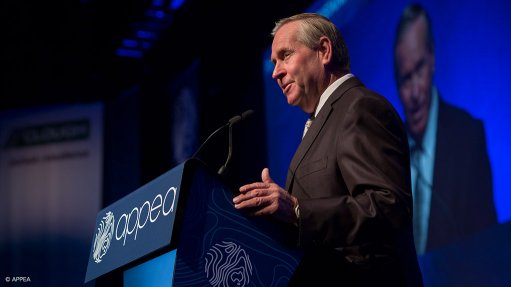
Colin Barnett
Photo by: APPEA
PERTH (miningweekly.com) – Western Australian premier Colin Barnett on Monday reprimanded the oil and gas industry for taking its relationships with the state and federal governments for granted.
Speaking on the first day of the Australian Petroleum Production and Exploration Association (Appea) conference, in Perth, Barnett said that while the industry excelled in discovering and exploiting new resources, its public positioning could use some work.
“As good as the technologies, discoveries and market understanding can be, you also have to get into alignment with government. It is the government that owns the natural resource, and the governments don’t just have a policy interest in your industry, but through their ownership, a direct interest in your projects.”
Barnett added that while the industry players spent a significant amount of energy on gaining its social licence through supporting local communities and adding to infrastructure, the ultimate social licence was in fact reaching an agreement and alignment with the federal and state governments.
The premier pointed to the controversy surrounding the development of the Browse liquefied natural gas (LNG) project as an example of the industry’s apparent disregard for its silent partner.
Barnett noted that on behalf of the Browse joint venture (JV) partners, the state government had taken the initiative of leading negotiations with traditional owners, and even acquiring land in a deal worth A$30-million, to establish an on-shore facility for the Browse LNG project at James Price Point.
“I think the state, under some difficulty, did its job. But the JV changed its mind and decided to go offshore in the form of a floating LNG project,” Barnett said.
“That was their right, and I don’t criticise them for that. But it does leave the government swinging high and dry on the issue.”
Barnett added that while industry participants were quick to point out that sovereign risk was an operating issue in Australia, there was also the opposite end of that issue; the risk that the government endured when it pursued a particular line of project development.
Pointing to the floating LNG development of the Browse project, Barnett said that the JV partners, which include Woodside, Shell, BP, Chevron and PetroChina, would be faced with some complications as the fields surrounding the Browse fields were owned by both state and federal governments.
“Usually offshore gas is owned by the federal government, but in this case, there are five retention leases that are owned by the commonwealth government and two that are owned by the state government,” Barnett said.
Before the state government signed off on the project, the Browse JV partners would have to agree to establish a supply base in Western Australia – at a site to be agreed upon with the government – and to supply gas into the domestic market.
“At this stage there is no alignment between the JV or the state and commonwealth government. But I’m sure those issues will be resolved as the industry is full of highly educated, bright and innovative people. But you do have a job in front of you,’ Barnett said.
The Browse project includes three gasfields estimated to contain a combined contingent resource of about 13.3-trillion cubic feet of dry gas and 360-million barrels of concentrate. First gas production had initially been slated for 2017.